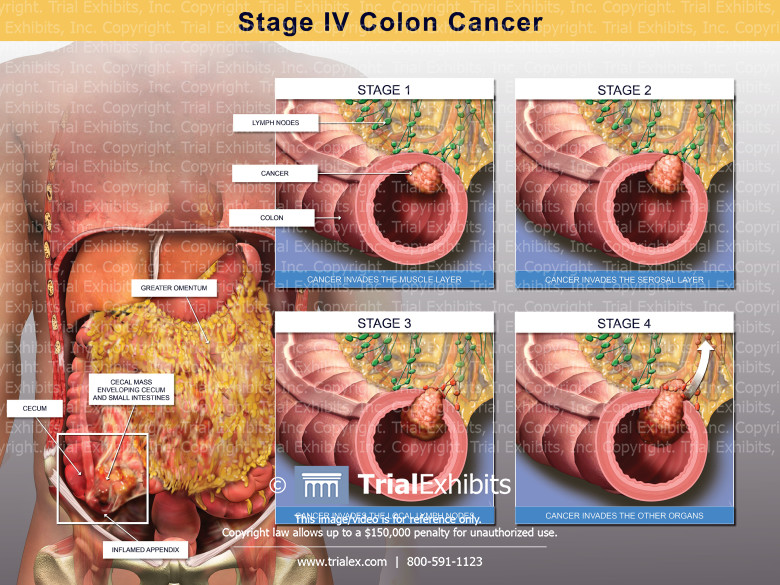Stage 4 colon cancer, often referred to as metastatic colon cancer, is a serious health issue that affects many individuals across the globe. The Pioneer Woman, a beloved figure in the culinary world, has brought attention to this disease through her own experiences and advocacy. This article aims to provide comprehensive information about stage 4 colon cancer, including its symptoms, treatment options, and the personal journey of those affected. By understanding this illness better, we can support those who are fighting it and encourage early detection.
The journey of understanding colon cancer is crucial, particularly for individuals who may be at risk. Colon cancer often develops slowly and may not present symptoms until it has reached an advanced stage. Therefore, awareness and education about the disease are essential. In this article, we will delve into the specifics of stage 4 colon cancer, explore the impact it has on lives, and highlight the importance of community support and medical advancements.
As we navigate through the complexities of stage 4 colon cancer, we will also discuss the personal stories of those affected, including the Pioneer Woman's own narrative. This approach will serve to humanize the statistics and facts, providing a relatable context for readers. Through this article, we hope to foster a greater understanding of colon cancer and inspire action towards prevention and support.
Table of Contents
Understanding Stage 4 Colon Cancer
Stage 4 colon cancer is the most advanced stage of the disease. At this stage, cancer has spread beyond the colon to other parts of the body, often affecting organs such as the liver and lungs. This metastasis makes treatment more complex and often indicates a poorer prognosis.
Key characteristics of stage 4 colon cancer include:
- Spread to distant organs or lymph nodes
- Potential for significant symptoms affecting quality of life
- Variety of treatment options available, but with varying success rates
Symptoms and Diagnosis
Diagnosis of stage 4 colon cancer typically involves several steps, including imaging tests and biopsies. Early symptoms may include changes in bowel habits, abdominal pain, and unexplained weight loss. However, these symptoms can often be mistaken for other conditions.
Common Symptoms of Stage 4 Colon Cancer
- Severe abdominal pain
- Persistent changes in bowel habits
- Fatigue and weakness
- Unexplained weight loss
- Jaundice (yellowing of the skin and eyes)
Diagnostic Procedures
To confirm a diagnosis, doctors may use:
- Colonoscopy
- CT or MRI scans
- Biopsy of tissues
Treatment Options
Treatment for stage 4 colon cancer often involves a combination of therapies. The goal may not always be to cure the cancer but to manage symptoms and prolong life.
Common Treatment Modalities
- Chemotherapy
- Targeted therapy
- Immunotherapy
- Surgery, if feasible
Each treatment plan is individualized based on the patient's overall health, the extent of disease spread, and other factors. Ongoing research continues to explore new options and combinations of treatments for better outcomes.
Pioneer Woman: A Brief Biography
| Name | Ree Drummond |
|---|---|
| Date of Birth | January 6, 1969 |
| Profession | Author, Blogger, TV Personality |
| Notable Works | The Pioneer Woman Cooks series |
| Website | thepioneerwoman.com |
Personal Journey with Stage 4 Colon Cancer
The Pioneer Woman has used her platform to raise awareness about colon cancer, sharing her personal experiences and advocating for regular screening. Her openness about the challenges faced during the journey has inspired many individuals battling similar conditions.
Ree Drummond's advocacy includes:
- Encouraging conversations about cancer
- Promoting awareness of symptoms and risks
- Supporting cancer research initiatives
Support Systems for Cancer Patients
A strong support system is crucial for individuals diagnosed with stage 4 colon cancer. Family, friends, and community resources can provide emotional and practical support throughout treatment.
Types of Support Available
- Support groups for patients and families
- Counseling services
- Online resources and forums
Engaging with these support systems can help patients feel less isolated and more empowered in their fight against cancer.
Statistics and Research on Colon Cancer
According to the American Cancer Society, colon cancer is the second leading cause of cancer-related deaths in the United States. The survival rate for stage 4 colon cancer varies but is generally lower than earlier stages.
Recent studies emphasize:
- Importance of early detection through screening
- Advancements in targeted therapies improving outcomes
- Ongoing research in genetic factors influencing cancer development
Conclusion
Stage 4 colon cancer is a significant health concern that requires awareness, research, and support. The Pioneer Woman's journey highlights the importance of advocacy and education in combating this disease. By understanding the symptoms, treatment options, and support systems available, we can better assist those affected by colon cancer.
We encourage readers to take action by getting screened, sharing their stories, and supporting cancer research initiatives. Your voice can make a difference.
Thank you for reading this comprehensive overview of stage 4 colon cancer. We invite you to leave comments, share this article, and explore more content on our site to stay informed and engaged.
We look forward to seeing you again soon. Your health matters!



ncG1vNJzZmivp6x7pLHNramonJWauaat0aegp59emLyue8%2BipayZo2Z8sbXOp5yeql2svK6tzWaaqKSfo3qkrc2cnKtlo6muqLGMbWWhrJ2h